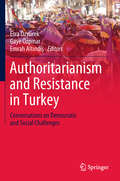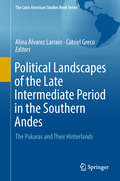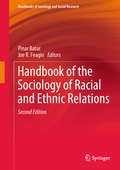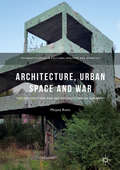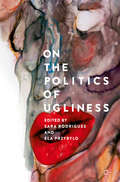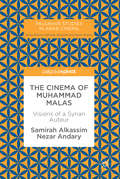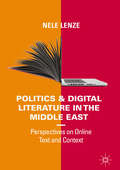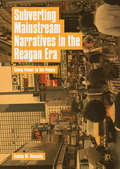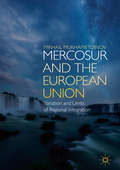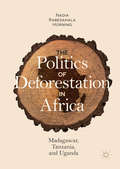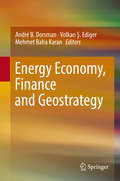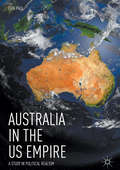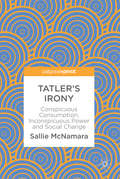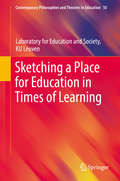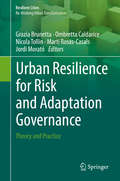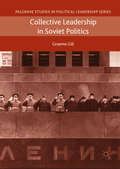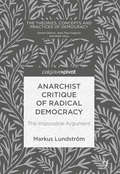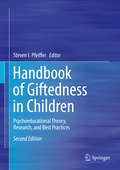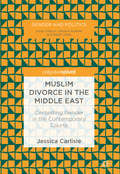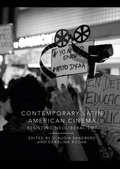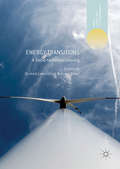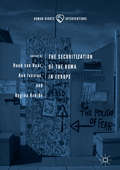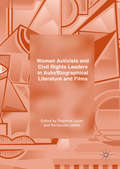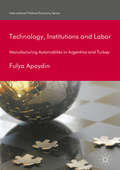- Table View
- List View
Authoritarianism and Resistance in Turkey: Conversations on Democratic and Social Challenges
by Esra Özyürek Gaye Özpınar Emrah AltındişThis book offers an in-depth overview of Turkish history and politics essential for understanding contemporary Turkey. It presents an analysis on a number of key issues from gender inequality to Islamism to urban regeneration. Based on interviews with leading intellectuals and academics from Turkey, the book’s theme follows the dramatic transformations that have occurred from the 1980 military coup to the coup attempt of 2016 and its aftermath. It further draws attention to the global flows of capital, goods, ideas, and technologies that continue to influence both mainstream and dissident politics. By doing so, the book tries to unsettle the assumption that Erdoğan and his Islamic ideology are the sole actors in contemporary Turkey. This book provides unusual insight into the Turkish society bringing various topics together, and increases the dialogue for people interested in democratic struggles in 21st century under neoliberal authoritarian regimes in general.
Political Landscapes of the Late Intermediate Period in the Southern Andes: The Pukaras And Their Hinterlands (The Latin American Studies Book Series)
by Alina Álvarez Larrain Catriel GrecoThis book studies the relationship between pukaras and their surrounding landscape, focusing on the architectural and settlement variability registered in both contexts. It is the outcome of a symposium held at the XIX National Congress of Argentine Archaeology (San Miguel de Tucuman, August 8–12, 2016) entitled, "Pukaras, strategic settlements and dispersed settlements: Political landscapes of the Late Intermediate Period in the Southern Andes." Based on the topics discussed at the event, this book presents nine case studies covering a large geographic area within the Southern Andes (northwestern Argentina, northern Chile and southern Bolivia), and breaking the national barriers that tend to atomize pre-Hispanic landscapes.The respective chapters cover a wide range of themes: from architectural and settlement variability, ways to build and inhabit space, social segmentation and hierarchy; to endemic conflict, analysis of accessibility and visibility, spatiality and temporality of landscapes; as well as new dating. This book goes beyond the Late Intermediate Period (LIP) analyses from the perspective of fortified settlements and material evidence related to war, by placing the focus on how ancient political landscapes were constructed from the relation between the pukaras and other sites as part of the same territory.The methodologies used include pedestrian surveys, photogrammetric surveys with UAVs (unmanned aerial vehicles) or drones, topographic and architectural surveys, excavations of households, ceramic and rock art analysis, and spatial analysis with geographic information systems (GISs). Given the numerous thematic interconnections between the contributions, the Editors have organized the chapters geographically, moving from south to north: from the southern valleys of Catamarca Province in Argentina to Lipez in the southern part of the Bolivian Altiplano, passing through the Calchaqui valleys of Catamarca, the puna and Quebrada de Humahuaca of Jujuy in northwest Argentina and the Antofagasta region in northern Chile.The book provides valuable new theoretical and methodological perspectives on the study of political landscapes of the Late Intermediate Period in the Southern Andes .
Handbook of the Sociology of Racial and Ethnic Relations (Handbooks of Sociology and Social Research)
by Joe R. Feagin Pinar BaturThe study of racial and ethnic relations has become one of the most written about aspects in sociology and sociological research. In both North America and Europe, many "traditional" cultures are feeling threatened by immigrants from Latin America, Africa and Asia. This handbook is a true international collaboration looking at racial and ethnic relations from an academic perspective. It starts from the principle that sociology is at the hub of the human sciences concerned with racial and ethnic relations.
Architecture, Urban Space and War: The Destruction and Reconstruction of Sarajevo (Palgrave Studies in Cultural Heritage and Conflict)
by Mirjana RisticThis book investigates architectural and urban dimensions of the ethnic-nationalist conflict in Sarajevo, the capital of Bosnia and Herzegovina, during and after the siege of 1992–1995. Focusing on the wartime destruction of a portion of the cityscape in central Sarajevo and its post-war reconstruction, re-inscription and memorialization, the book reveals how such spatial transformations become complicit in the struggle for reconfiguration of the city’s territory, boundaries and place identity. Drawing on original research, the study highlights the capacities of architecture and urban space to mediate terror, violence and resistance, and to deal with heritage of the war and act a catalyst for ethnic segregation or reconciliation. Based on a multi-disciplinary methodological approach grounded in architectural and urban theory, the spatial turn in critical social theory and assemblage thinking, as well as techniques of spatial analysis, in particular morphological mapping, the book provides an innovative spatial framework for analyzing the political role of contemporary cities.
On the Politics of Ugliness
by Sara Rodrigues Ela PrzybyloUgliness or unsightliness is much more than a quality or property of an individual’s appearance—it has long functioned as a social category that demarcates access to social, cultural, and political spaces and capital. The editors of and authors in this collection harness intersectional and interdisciplinary approaches in order to examine ugliness as a political category that is deployed to uphold established notions of worth and entitlement. On the Politics of Ugliness identifies and challenges the harmful effects that labels and feelings of ugliness have on individuals and the socio-political order. It explores ugliness in relation to the intersectional processes of racialization, colonization and settler colonialism, gender-making, ableism, heteronormativity, and fatphobia. On the Politics of Ugliness asks that we fight against visual injustice and imagine new ways of seeing.
The Cinema of Muhammad Malas: Visions of a Syrian Auteur (Palgrave Studies in Arab Cinema)
by Samirah Alkassim Nezar AndaryThis book provides an in-depth and intimate study of the cinema of Muhammad Malas. One of the well-known auteurs of Arab and Syrian cinema, Malas’s distinctive cinematic project has always confronted the social and political issues of his time. From feature films Dreams of the City, The Night, Bab al Maqam (Passion), and Ladder to Damascus to documentaries such as The Dream and Aleppo: Maqamat of Pleasure, Malas’s films challenge and explore Arab culture and history. Archival images run through the chapters of this book which combines insightful interviews with excerpts from Malas’s literary works and critical explorations of his cinematic style and thematic concerns. The book concludes with Malas’s own words, sharing the treatment of his film project Cinema al-Dunya.
Politics and Digital Literature in the Middle East: Perspectives On Online Text And Context
by Nele LenzeDuring the 2000's, online literature in Arabic language was popular among a larger readership. Writings on subjects dealing with politics, globalization, and social matters gained are well-received. While mapping the genre, this monograph shows literary developments in print and digital during these peak years to provide a historical context for the material. Online literary culture is linked to social, economic, and political developments within the last two decades. This book presents the differences between online and print literature as it relates to writer-readership interaction, literary quality, language and style, critical reception, and circulation. The geographic location of the analysis focuses on Gulf countries featuring a comparative study of Egypt and Lebanon.
Subverting Mainstream Narratives in the Reagan Era: Giving Power To The People
by Ashley M. DonnellySubverting Mainstream Narratives in the Reagan Era explores how artists, novelists, and directors were able to present narratives of strong dissent in popular culture during the Reagan Era. Using but subverting the tools of mainstream novels and films, these visionaries’ works were featured alongside other books in major bookstores and promoted alongside blockbusters in movie theatres across the country. Ashley M. Donnelly discusses how the artists accomplished this, why it is so important, and how new artists can use these techniques in today’s homogenous and mundane media.
MERCOSUR and the European Union: Variation And Limits Of Regional Integration
by Mikhail MukhametdinovThe book draws comparison between MERCOSUR and the European Union to explain variation of regionalism and to expose its limits. The project is based on the idea that contemporary examples of regionalism should be evaluated against several propositions of multiple integration theories rather than against a single theory. In order to systematically explain why and how integration outcomes in MERCOSUR differ from those in the EU, the author develops an analytical framework for the comparison of the two blocs. MERCOSUR is compared with the EU by the use of the various criteria of economic interdependence, economic convergence, intra-bloc size and interest asymmetries, cultural diversity and geostrategic motivations, which are identified as the salient parameters of integration theories.
The Politics of Deforestation in Africa: Madagascar, Tanzania, And Uganda
by Nadia Rabesahala HorningThis book explores how environmental policies are made and enforced in Africa. Specifically, this project explains the gap between intent and impact of forest policies, focusing on three African societies facing persistent deforestation today: Madagascar, Tanzania, and Uganda. The central claim of the study is that deforestation persists because conservation policies and projects, which are largely underwritten by foreign donors, consistently ignore the fact that conservation is possible only under limited and specific conditions. To make the case, the author examines how decision-making power is negotiated and exercised where communities make environmental decisions daily (local level) and where environmental policies are negotiated and enacted (national level) across three distinct African political systems.
Health Innovation and Social Justice in Brazil
by Maurice Cassier Marilena CorreaThis book examines the construction of an innovation system in Brazil’s health industries over the past twenty years. The authors argue that the system has remained active despite the crisis that began in 2014. However, while this crisis has led to cuts in public spending on research and health, it has simultaneously tended to stimulate local production and invention aimed at reducing deficits in the trade in medicines and medical technologies. The contributors highlight a model combining the acquisition of new technologies with social justice and the right to health, and introduce new concepts of the “nationalization” of technologies, innovation through copying and civil society regulation of industrial property and of the medicinal drug market.
Energy Economy, Finance and Geostrategy
by Mehmet Baha Karan André B. Dorsman Volkan Ş. EdigerThis volume investigates the impact of energy issues on geostrategy. The crucial importance of energy and the fact that fossil fuels are not equally distributed among countries means that decisions are not only based on financial arguments, but also on the political impact. It can be said that "Energy is Politics". In three parts - 1) Energy Economy; 2) Finance; and 3) Geostrategy - academics and practitioners address both economic and political questions and present cases from several countries.This is the sixth volume in a series on energy organized by the Centre for Energy and Value Issues (CEVI). The previous volumes in the series were: Financial Aspects in Energy (2011), Energy Economics and Financial Markets (2012), Perspectives on Energy Risk (2014), Energy Technology and Valuation Issues (2015) and Energy and Finance (2016).
Australia in the US Empire: Australia In The Us Empire
by Erik PaulThis book argues that Australia is vital to the US imperial project for global hegemony in the struggle among great powers, and why Australia’s deep dependency on the US is incompatible with democracy and the security of the country. The Australian continent is increasingly a contestable geopolitical asset for the US grand strategy and for China’s economic and political expansionism. The election of Donald Trump to the US presidency is symptomatic of the US hegemonic crisis. The US is Australia’s dangerous ally and the US crisis is a call for Australia to regain sovereignty and sever its military alliance with the US. Political realism provides a critical paradigm to analyse the interactions between capitalism, imperialism and militarism as they undermine Australian democracy and shift governmentality towards new forms of authoritarianism.
Tatler's Irony: Conspicuous Consumption, Inconspicuous Power And Social Change
by Sallie McNamaraThis book discusses Tatler, a monthly glossy magazine aimed at the wealthiest groups in British society, to consider how it addresses social change. The volume addresses specifically the period from 1997, the year New Labour was elected under Tony Blair, up to 2010, when the Conservative party and David Cameron came in to power. Sallie McNamara scrutinizes how the magazine negotiates ideas of ‘Britishness’, class, gender and national identity in a changing social, political, economic and cultural climate. Additionally, she explores the magazine’s humorous approach, and looks at how that distinctive address can potentially lead to misinterpretation. The British class system has seen many challenges over the period of the magazine’s history, and this study expertly grapples with exactly how Tatler has maintained its audience in a continually changing social environment.
Sketching a Place for Education in Times of Learning (Contemporary Philosophies And Theories In Education Ser. #10)
by Society Laboratory For EducationThis book explores how traditional institutions of education are affected by the current discourse and practices of ‘learning’; and more specifically, how the evolution towards so-called ‘learning environments’ affects the kind of gathering or association that is staged and configured within families, schools and universities. In addition, it addresses the question of how to articulate what is educational in the context of ‘making’ family, school or university, and to what extent this making is always also a public act. The aim is to approach and investigate family, school and university as educational practices, to focus on the forms of gatherings or associations that take shape within them, and to explore the public, but also possible ‘privatizing’ character of these aspects. The book presents a diverse range of sketches intended as preparatory study exercises. What they all share, despite the different hands and eyes, and the different sensitivities, is the attempt to figure out what education is all about. Three objectives can be distinguished for the sketches: a cartographic one (to map the discourse of learning but also the discursive and material arrangements of actual educational practices), a morphological one (to describe the educational forms of gathering) and a theoretical one (to bring educational issues into the discussion). The book’s overall aims are to re-establish ‘the educational’ as an issue; to make it visible, to give it shape, to give it a voice, and to make it a thing that can and should be discussed, thus establishing a point of departure for further inquiry and its (re)invention.
Urban Resilience for Risk and Adaptation Governance: Theory and Practice (Resilient Cities)
by Grazia Brunetta Ombretta Caldarice Nicola Tollin Marti Rosas-Casals Jordi MoratóThis book brings together a series of theory and practice essays on risk management and adaptation in urban contexts within a resilient and multidimensional perspective. The book proposes a transversal approach with regard to the role of spatial planning in promoting and fostering risk management as well as institutions’ challenges for governing risk, particularly in relation to new forms of multi-level governance that may include stakeholders and citizen engagement. The different contributions focus on approaches, policies, and practices able to contrast risks in urban systems generating social inclusion, equity and participation through bottom-up governance forms and co-evolution principles. Case studies focus on lessons learned, as well as the potential and means for their replication and upscaling, also through capacity building and knowledge transfer. Among many other topics, the book explores difficulties encountered in, and creative solutions found, community and local experiences and capacities, organizational processes and integrative institutional, technical approaches to risk issue in cities.
Collective Leadership in Soviet Politics (Palgrave Studies In Political Leadership Ser.)
by Graeme GillThis book studies the way in which the top leadership in the Soviet Union changed over time from 1917 until the collapse of the country in 1991. Its principal focus is the tension between individual leadership and collective rule, and it charts how this played out over the life of the regime. The strategies used by the most prominent leader in each period – Lenin, Stalin, Khrushchev, Brezhnev and Gorbachev – to acquire and retain power are counterposed to the strategies used by the other oligarchs to protect themselves and sustain their positions. This is analyzed against the backdrop of the emergence of norms designed to structure oligarch politics. The book will appeal to students and scholars interested in the fields of political leadership, Soviet politics and Soviet history.
Anarchist Critique of Radical Democracy: The Impossible Argument (The Theories, Concepts and Practices of Democracy)
by Markus LundströmThis book addresses the conflictual nature of radical democracy. By analyzing democratic conflict in Husby, a marginalized Stockholm city district, it exposes democracy’s core division – between governors and governed – as theorized by Jacques Rancière. Tracing the genealogy of that critique, the book interrogates a historical tradition generically adverse to every form of governance, namely anarchism. By outlining the divergent and discontinuous relationship between democracy and anarchy – within the history of anarchist thought – the author adds to democratic theory ‘The Impossible Argument’: a compound anarchist critique of radical democracy.
Handbook of Giftedness in Children: Psychoeducational Theory, Research, and Best Practices
by Steven I. PfeifferIn one comprehensive resource, this superb handbook covers everything you need to know about the subject. It brings together leading experts from the fields of psychology and education, combining theory and applied empirical research on such crucial topics as conceptualization, types of intelligence, developmental considerations, and ethical and legal concerns. Particular attention is given to social and family contexts, and evidence-based strategies and interventions offer solid guidelines on assessment, curriculum design, and encouraging and nurturing talent – from preschool through adolescence.
Muslim Divorce in the Middle East: Contesting Gender in the Contemporary Courts (Gender and Politics)
by Jessica CarlisleHow have Muslim marriages legally ended around the turn of the 21st century? Who has the power to initiate and resist shari‘a derived divorce? When are husbands and wives made to bear the costs of their marital breakdown? What does divorce law indicate about the development of gender regimes in the Middle East and North Africa? This book opens with a description of the historical development of Islamic divorce in the MENA. Subsequent chapters follow a Syrian male judge, a Moroccan female legal advice worker and a Libyan female judge as they deal with divorce cases in which husbands, wives, their relatives and lawyers debate gender roles in contemporary Muslim marriages. MENA ‘state feminism’ has increasingly equalized men’s and women’s access to divorce and encouraged discussions about how spouses should treat each other in marriage. The real life outcomes of these reforms have often been surprising. Moreover, as the last chapter explores, jihadi proto-states (such as Islamic State) have violently rejected state feminist divorce law reform. This accessible book will appeal to students, researchers and a general readership interested in Islamic law; Middle Eastern studies; gender and sexuality; and, legal and social anthropology.
Contemporary Latin American Cinema: Resisting Neoliberalism?
by Carolina Rocha Claudia SandbergContemporary Latin American Cinema investigates the ways in which neoliberal measures of privatization, de-regularization and austerity introduced in Latin America during the 1990s have impacted film production and film narratives. The collection examines the relationship between economic policies and the films that depict recent transformations in many Latin American countries, demonstrating how contemporary Latin American film has not only criticized and resisted, but also benefitted from neoliberal advancements. Based on films produced in Argentina, Bolivia, Brazil, Chile, Colombia, Ecuador, Mexico and Peru since 2010, the fourteen case studies illustrate neoliberalism’s effects, from big industries to small national cinemas. It also shows the new types of producers that have emerged, and the novel patterns of distribution, exhibition and consumption that shape and influence the Latin American filmscape. Through industry studies, reception analyses and close readings, this book establishes an informative and accessible text for scholars and students alike.
Energy Transitions
by Alain Nadaï Olivier LabussièreThis book elucidates what it means to transition to alternative sources of energy and discusses the potential for this energy transition to be a more democratic process. The book dynamically describes a recent sociotechnical study of a number of energy transitions occurring in several countries - France, Germany and Tunisia, and involving different energy technologies - including solar, on/off-shore wind, smart grids, biomass, low-energy buildings, and carbon capture and storage. Drawing on a pragmatist tradition of social inquiry, the authors examine the consequences of energy transition processes for the actors and entities that are affected by them, as well as the spaces for political participation they offer. This critical inquiry is organised according to foundational categories that have defined the energy transition - ‘renewable’ energy resources, markets, economic instruments, technological demonstration, spatiality (‘scale’) and temporality (‘horizon(s)’). Using a set of select case studies, this book systematically investigates the role these categories play in the current developments in energy transitions.
The Securitization of the Roma in Europe (Human Rights Interventions Ser.)
by Huub Van Baar Ana Ivasiuc Regina KreideThis book discusses how Europe’s Roma minorities have often been perceived as a threat to majority cultures and societies. Frequently, the Roma have become the target of nationalism, extremism, and racism. At the same time, they have been approached in terms of human rights and become the focus of programs dedicated to inclusion, anti-discrimination, and combatting poverty. This book reflects on this situation from the viewpoint of how the Roma are often ‘securitized,’ understood and perceived as ‘security problems.’ The authors discuss practices of securitization and the ways in which they have been challenged, and they offer an original contribution to debates about security and human rights interventions at a time in which multiple crises both in and of Europe are going hand-in-hand with intensified xenophobia and security rhetoric.
Women Activists and Civil Rights Leaders in Auto/Biographical Literature and Films
by Delphine Letort Benaouda LebdaiThis collective book offers new insight on the genres of biography and autobiography by examining the singular path of those deemed to be ‘outsiders’, such as Winnie Mandela, Ida B. Wells, Malcolm X and Harvey Milk. Its specific focus on these female leaders and civil rights activists, who refused to be constrained by gender, race and class, shifts attention away from the great men of history and places it solely on those who have transformed their personal lives into a fight for collective goals. With an interdisciplinary approach that looks at literature, cinema and cultural studies, Women Activists and Civil Rights Leaders in Auto/Biographical Literature and Cinema argues that life writing is a key source of artistic creativity and activism which enables us to take a fresh look at history.
Technology, Institutions and Labor: Manufacturing Automobiles In Argentina And Turkey (International Political Economy Ser)
by Fulya ApaydinIn this book Fulya Apaydin argues that labor responses to dramatic technological change are influenced by the political institutions of the Global South more than any other factor. In addressing vocational education programs – which are highly relevant in understanding how labor unrest is governed in developing settings – she makes two important contributions. Firstly, she offers a new theoretical framework to understand labor mobilization and de-mobilization patterns, rethinking vocational education as a key transmission belt for manufacturing labor consent. Secondly, she provides a systematic comparison of skill formation schemes and their implications on labor mobilization in federal and unitary systems. With a focus on Argentina and Turkey, two case studies are provided in which technology has provoked differing levels of strikes, walkouts and extended protest.
